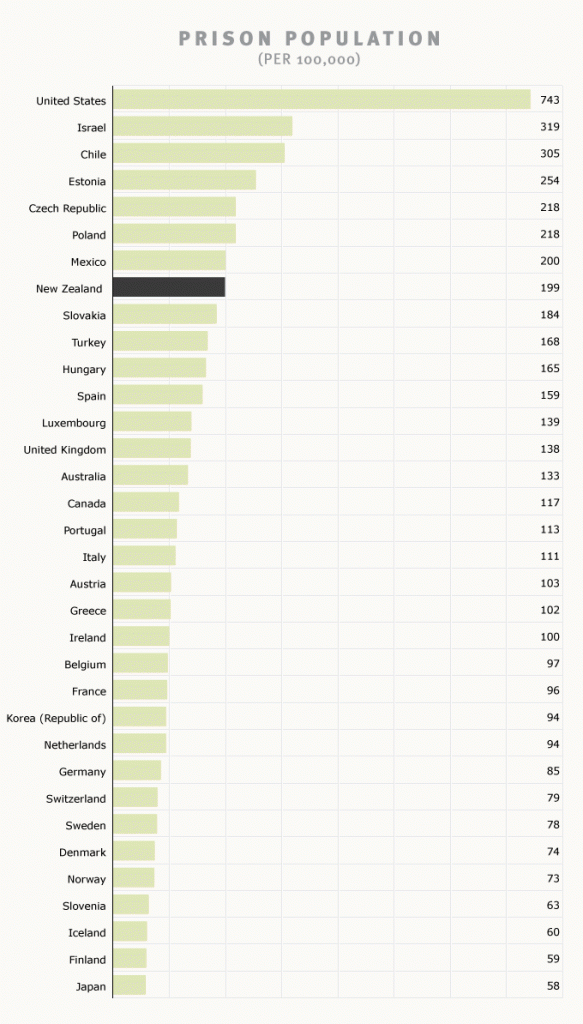We’re not number two.
From Stuff
New Zealand had the second highest imprisonment rate in the world, with an overrepresentation and disproportionate rate of Maori prisoners. “This has attracted comment from the United Nations and overseas media.”
This is half right. There is certainly serious overrepresentation of Maori in the prison population. However, New Zealand doesn’t have the second highest imprisonment rate in the world. Or even in the OECD. And it’s not hard to find this out.
The Encyclopedia of New Zealand, Te Ara, gives this graph, dated May 2011, for OECD countries, referencing the International Center for Prison Studies (PDF)
Wikipedia has NZ in 74th place for all countries, referencing the same source, behind most of the Caribbean, much of the former Eastern Bloc, and Samoa. So, whether you’re going for easily accessible online references like Wikipedia and Te Ara or actual expert data curation, you get the same results.
New Zealand’s imprisonment rate is too high. I don’t see a good reason why it should be much higher than, say, Australia or the less wealthy Western European countries. But it’s not second in the world by any reasonable definition of “the world”.
(Update: Graeme Edgeler wrote about another airing of this recently, which I had thought I remembered, but couldn’t find when writing this.)
Thomas Lumley (@tslumley) is Professor of Biostatistics at the University of Auckland. His research interests include semiparametric models, survey sampling, statistical computing, foundations of statistics, and whatever methodological problems his medical collaborators come up with. He also blogs at Biased and Inefficient See all posts by Thomas Lumley »

It is interesting, looking at that list, where Canada ranks. As a young man I remember a fair amount of angst that we were imprisoning too many people.
I think that, perhaps, the fair comparison is not with “how are others doing” as with “what would be a just outcome” or “what would a good criminal justice system produce in terms of outcomes”. Now maybe the current rates are appropriate (I am not a specialist in CJ by any stretch of the imagination). I don’t know. But the variations among the Anglo-Saxon countries (US, UK, NZ, Aus, Can) are interesting as I would have expected similar underlying crime issues in each. Perhaps a naïve expectation?
10 years ago
The links you’re looking for:
https://twitter.com/RuminatorNZ/status/399616334801039361
http://ruminator.co.nz/the-edge-of-reason-nzs-prison-rate-were-number-6/
10 years ago
Ah yes, thanks. I searched Graeme’s Public Address blog, but I had forgotten about The Ruminator.
10 years ago
I’m hurt that you forgot about us :)
Nah I’m good. Thanks for the linkback!
10 years ago
From what I have heard our prison population has been decreasing (which aint that surpising as the population ages).
It’s a bit of a problem because the govt have outsourced (some) prisoning but are paying by number of beds and not number of prisoners.
If drug policy slackens off (and there is continued pressure that way) then we’re going to have a big prison to pay for with noone in it.
And on second thoughts – is this data age standardised?
10 years ago
It’s not age-standardised. That partially explains Mexico and Israel, but Poland, Czech Republic, Estonia, and Chile have vaguely similar population age structures to NZ (somewhat to my surprise, actually).
10 years ago